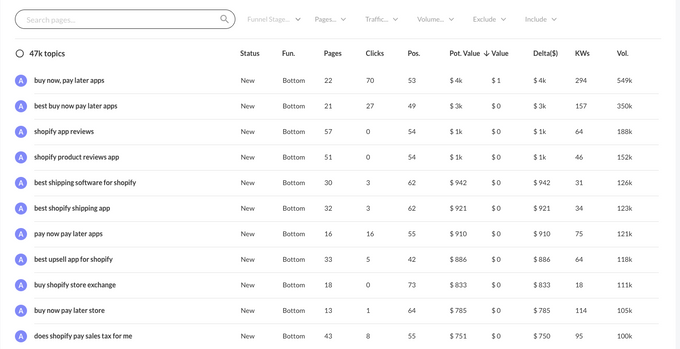Topical authority in SEO: Why it's important and how to master it
Boost your visibility and get your site to the top of those search results by building topical authority that lasts.
Updated July 12, 2024

AI Summary
Gaining visibility and trust around specialized topics is vital for brands today, but earning recognition as an authority in competitive spaces dominated by heavyweight sites can seem impossible. That's where topical authority comes in.
By consistently publishing comprehensive, accurate information within your niche, you can build credibility and authority over time. Let's explore some actionable strategies for building topical authority even in highly competitive industries.
Key takeaways
- Topical authority is a key ranking factor because it signals to search engines that a website is a credible source for specific topics.
- Having high topical authority is crucial for websites to rank for competitive keywords.
- You can build topical authority by following a specific process.
- Measuring topical authority is difficult but not impossible.
What is topical authority?
Topical authority is a term used to describe how search engines, particularly Google, measure a website's ability to provide credible content on a certain topic. It essentially imitates how people operate. For example, if you have a sore throat, you'd see a doctor you trust. You'd recognize their medical expertise through signals like a university degree, work experience, and patient recommendations.
Similarly, search engines look at various signals, such as a website's content, to assess its expertise and authority on specific topics. For instance, a site like Investopedia has a lot of content on personal finance, loans, ETFs, and stocks. Google can see that its content is high-quality and recognizes that Investopedia has topical authority in these areas.
Why is topical authority important for SEO?
Topical authority plays a large role in how search engines rank content, particularly in the three following ways.
Providing trustworthy results
Google uses topical authority to deliver trustworthy results. Think about it like this. If you search for health-related information, you'll get trustworthy results from Mayo Clinic or Healthline. But if a website that isn't an authority in the health industry, like Shopify for example, somehow outranks them, Google's results wouldn't seem as reliable.
Assessing what content is accurate
Search engines can't directly verify the correctness of content across billions of topics. Instead, they use signals from the website itself. By recognizing that a website is a trusted source on a specific topic (like Healthline for health or Investopedia for finance), search engines can assume the content they produce is trustworthy.
This is the core idea behind topical authority. It's one of the most important signals, out of thousands, that search engines use to determine which content is likely to be correct.
Selecting the best content to rank
Search engines classify information in layers, each built on many different signals until you get a score. This score is for specific topics and is derived from many underlying signals. This is how search engines rank content.
Anyone creating content for SEO must establish topical authority in their domain to rank. Without it, your chances of ranking decrease dramatically. The more competitive your domain, the higher your topical authority needs to be to rank well.
» Establish topical authority with an AI-driven topical authority model.
How does topical authority work?
Google looks at specific signals that indicate whether a website has authority on a specific topic. These signals include how often a topic is mentioned on a site, the types of pages it's mentioned on, and how much traffic these pages receive.
Google can also give websites individual scores for each topic they rank for, depending on the following factors:
- The topic's importance on the website
- The amount and quality of content on the topic
- The comprehensiveness of the content
- The quality of internal links
- The number of backlinks from other websites
- The performance of these topics
Of course, it's more complex than that because the topics that a website ranks for are not black and white. There's a lot of gray area. However, it's not necessarily important to know exactly how Google operates. What matters is understanding the core idea: Google wants to know which website can provide the most credible answer to a question. Then, you'll begin to understand what signals they may use and how to build your content.
» Let's improve your topical authority. Talk to an SEO expert.
How to build topical authority
Building topical authority can be challenging, especially for competitive topics where more established sites dominate the search results. However, it's achievable if you focus on these six ingredients.
1. Optimize your site structure
Clearly stating what your business does on the homepage and building detailed product and solution pages is crucial for any website. These core pages should accurately explain your offerings using terms people commonly search for to help both search engines and users understand what your website is about. The structure of your website, especially your homepage, product pages, and feature pages, is the most important indicator in the beginning.
2. Perfect your technical SEO
The second important aspect is ensuring your website is structured correctly for SEO. This means making it easy for search engines to crawl and understand by optimizing your meta tags and descriptions, schema markup, page speed, etc. This is a basic but crucial step in optimizing a site for search engines.
» Get perfectly SEO'd pages out of the box with Entail's no-code page builder.
3. Conduct research to develop an effective content strategy
You have to do plenty of research to build topical authority, especially about the relationship between topics. Start by identifying your main keywords. For example, if you're a company like BetterHelp or TalkSpace, your main keyword would be "online therapy." Adding different combinations of personas, conditions, and locations would form your bottom-of-the-funnel keywords—"online therapy for kids with anxiety in Los Angeles," for example. The main pages on your website (i.e., your homepage, feature pages, solutions pages, and product pages) should be based on these keywords.
From there, research related topics. If you're selling online therapy for kids with anxiety, explore all the topics related to anxiety and kids with anxiety. Map these topics, build content verticals on your website to cover them, and start creating content. This helps build a comprehensive, well-structured website that demonstrates topical authority.
» Solve topic selection with Entail's content strategy software.
4. Create high-quality content
Most of the work in building topical authority comes from creating content. By providing accurate and detailed information on the topics relevant to your site, you create quality content and become a topical authority. This content must cover relevant topics and be well-structured. Simply publishing low-quality or AI-generated content without value won't build topical authority.
» Produce high-authority content with Entil's content marketplace.
5. Demonstrate E-E-A-T in your content
E-E-A-T, which stands for expertise, experience, authority, and trust, is essential for websites to build topical authority and rank well on Google. To demonstrate these qualities, you need to show your expertise and authority on a topic. For example, a pediatrician might highlight their education from a prestigious university, their work at a reputable hospital, or notable patients they've treated.
It used to be E-A-T, but Google recently added "experience." This addition is important in the age of AI, where information is easily accessible but not always accurate or reliable. While AI tools like ChatGPT can provide general answers on certain topics, these responses may contain inaccuracies that non-experts might not catch. Make sure you use experts to create your content so that the principles of E-E-A-T shine through.
» Hire domain experts to create quality content that builds topical authority.
6. Internal linking and link building
Internal linking is an essential part of establishing topical authority. Always make sure you're linking from one page to another based on related topics. For example, if you have a page about anxiety symptoms that also ranks for anxiety treatments, you can use this as anchor text to link to a dedicated page about treatments for anxiety. This strategy helps search engines understand the relationships between your content and strengthens your overall topical authority.
Backlinks from other websites are just as important. You should aim to build or encourage links from relevant, authoritative websites. These external links pass on authority and serve as recommendations for your site.
How to measure topical authority
Topical authority is very difficult to measure because of the large amount of keywords involved. Think about it like this: a successful website can easily rank for hundreds of thousands or even millions of keywords. How do you measure them all?
The key is to look at topics rather than individual keywords. Group related keywords into topics and then related topics into clusters.
Let's use online therapy as an example again. Say we have a group of topics like "What is anxiety," How to treat anxiety," "Anxiety symptoms," and "General anxiety disorder." Each of these topics would go into the anxiety topic cluster.
When you eventually measure topical authority, you need to look at your impressions, traffic, and where you rank on each topic. So, if this topic cluster has a total search volume of one million searches per month and your average position is 10, it suggests you have decent topical authority. In other words, the higher you rank, the more authority you have on a topic.
By examining how an entire cluster ranks, you can assess your authority on that topic. Still, this can be a challenge, given the multitude of keywords, topics, and topic clusters that you rank for.
» Chat with us to find out how to measure topical authority on your site.
Measure topical authority with Entail's topic research solution
Entail AI's content strategy software simplifies the entire process of measuring topical authority by helping you map relevant topics, understand their potential value, group them into clusters, and more.
This data is compiled into reports like this one, allowing you to easily assess your website's authority on specific topics by examining factors like traffic, impressions, average position, and overall impact.
Stay top of mind as an authority
Gaining traction as a reputable authority can be challenging, but your commitment will pay off over time. By creating high-quality, authentic content that spotlights your expertise and sticking to best practices that build user trust and create value, you slowly but surely elevate your site's authority.
Stay patient and focused on providing value for your audience, and you'll steadily grow into an established high-authority site.





